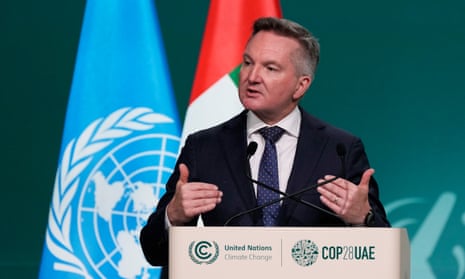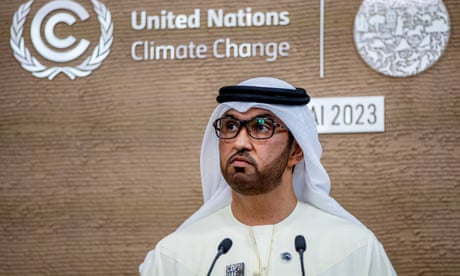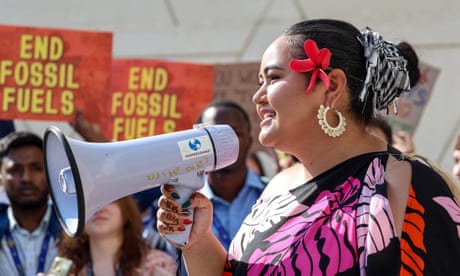Extract from The Guardian

Australia’s climate minister says summit must aim to keep 1.5C goal alive so Pacific countries are not ‘swallowed by the seas’
Mon 11 Dec 2023 06.31 AEDT
Last modified on Mon 11 Dec 2023 07.34 AEDTThis came as the president of the Cop, Sultan Al Jaber, convened a majlis – a meeting in the traditional form of an elders’ conference in the United Arab Emirates – between all countries late on Sunday in an attempt to reach consensus on points of deadlock, including whether fossil fuels should be phased out or phased down.
The two-week conference has just a day and a half of official negotiating time left before it is scheduled to end on Tuesday morning.
Bowen told the majlis that a global stocktake for the summit had found the world was not on track to stay within 1.5C of heating, and the response “must be anchored in keeping 1.5 alive”.
He said global emissions must peak by 2025 and be cut by 43% by 2030 and 60% by 2035 compared with 2019 levels, and that renewable energy should be tripled by 2030. “I think that should be reflected in the outcome,” he said.
“We also must face this fact head on: if we are to keep 1.5C alive, fossil fuels have no ongoing role to play in our energy systems – and I speak as the climate and energy minister of one of the world’s largest fossil fuel exporters. And we embrace that fact and acknowledge it because we also live in the Pacific, and we are not going to see our brothers and sisters inundated and their countries swallowed by the seas.”
Bowen said there were “many ways” the language adopted at the talks could reflect that fossil fuels did not have a future, and told the president: “We’ll be flexible with you to find the pathway to give you the chance you need to write that into history.”
He signalled that could include attaching the word “unabated” to any decision about phasing out fossil fuels. Unabated is a controversial and undefined term at climate talks that is usually taken to mean fossil fuels can continue if their emissions are being reduced through the use of carbon capture and storage, a technology that has not proven commercially viable.
Bowen said talking about abatement of fossil fuels in a deal should not be seen as a justification for countries to just keep using them. “We don’t need to phase out fossil fuel emissions, we need to end the use of fossil fuels in our energy systems, with abatement as a backstop and goalkeeper, not as an excuse for delay or inaction,” he said.
His intervention came in an often impassioned session in which Al Jaber asked countries to speak without notes or a prepared speech.
Diego Pacheco, chief spokesperson for the Like Minded Group of Developing Countries that includes China, India and Saudi Arabia, had earlier accused the US, Norway, Australia and Canada of hypocrisy for supporting an agreement to phase out fossil fuels while planning to expand their own production.
Vanuatu’s climate change minister, Ralph Regenvanu, told the Guardian he backed a call by Pacific and small island states for a deal to completely phase-out fossil fuels and fossil fuel subsidies, and an immediate halt to fossil fuel expansion.
“There’s a big push back on having unabated in there,” he said. “If it is in there it would have to be ring-fenced and time bound.”
Regenvanu said while he did not agree with Bowen on “unabated” his country was “really happy with what Australia has been saying at this Cop”. “It’s a real change,” he said.
He said the major problem with Australia’s stance remained its huge coal and gas exports. He called on countries to back a fossil fuel non-proliferation treaty as it would require countries to act on the coal, gas and oil they exported and not just what they used at home.
Bowen’s position on abated fossil fuels drew sharp criticism from climate campaigners.
Greenpeace’s Pacific adviser, Shiva Gounden, said the minister had the opportunity to “speak from a place of empathy” during the majlis but instead had been disrespectful. “He spoke like Australia was the moral authority on climate justice now, while the country still expands new fossil fuel projects,” he said.
The director of Climate Solutions for Australia, Barry Traill, said much of Bowen’s speech was a “clear and blunt explanation” of how fossil fuels must be removed but it was frustrating that he had supported a word that could be used by “frankly bullshit projects stating that they will remove pollution after it’s been put into the atmosphere”.
Beyond the future of fossil fuels, another major sticking point at the talks is developing countries’ anger over a lack of support from the wealthy to help them adapt to the effects of the climate crisis.
The president was expected to draw up a draft agreement text overnight Sunday UAE time before negotiations resume on Monday.



No comments:
Post a Comment